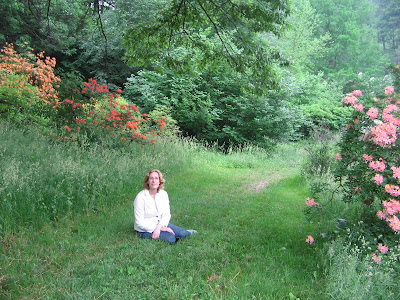Aaaaah, it’s quite nice to follow the European tradition of taking the entire month of August off. Or, in my case, offline. I was working full time to make up for my July holiday, and my move from cramped Brighton to lovely Cambridgeport occupied most of my evenings and weekends. I had to sacrifice blogging, but in return, I got a lot done, and managed to squeeze in some spectacular times: more than one trip to the beach (and many, many fried clams), a day in the mountains, a day with the loons by the lake, a weekend in Tanglewood (albeit in the somewhat uncomfortable quarters of a pup tent), and visits with family and friends. All this, but I’ve barely sung a note.
Now that I’m more settled in my new place (which I’ll swoon about later), it’s time to get cracking on the many projects I hope to accomplish this year, not least the moving of my singing to the next level. September hit with full-force busyness, as I start using my palm pilot for the first time in three months to schedule in lessons, rehearsals, gigs, and even classes. There’s always a little panic as the year begins again, but for some reason I’m not coming to the work with dread, as I often do. I’ve spent much of the past year convinced of my own imminent failure. But despite best efforts to that end, I managed to find some success. I can’t help but have a better attitude toward everything now, even if having that optimism means the risk of diminishing my gallows humor or writing nothing but trite inspirational fluff. I feel like I’m molting off old stumbling blocks, and allowing myself to use the tools I have on hand. Believe it or not, the source for all this comes from opera camp this summer.
I came to the stage in fear. I viewed my colleagues as liabilities, all of them prone to mistakes that would affect my own performance, all of whom would need help onstage to work their way out of near-disasters. I wanted them to be leaders, to take care of me and to improve my performance just by their presence. In my experience learning language, my skills rise or fall to the level of my conversation partners. In rehearsals, I learned new tricks and was deeply inspired by some of my most talented colleagues, but also worried on behalf of the ones who barely knew their parts and wouldn’t allow themselves to get into character. Eventually I figured out that if I wanted a leader onstage, I would have to look to myself. The attitude isn’t every man for himself up there, but more like, how can I help my fellow performers? How can I be the one who raises their performances to a higher level? It will take me a few more performing opportunities to learn how to relax with this idea, but I managed to shirk some of the fear, and remember why I ever found performing fun in the first place.
The more questions you bring to performing, the better it becomes. How do I want the audience to feel about me? Do I want them to be as emotionally involved with the song as I am, and forget that they’re even sitting in this room? Or do I want them to make feel sorry for me, and think about how difficult it must be to sing? How should they feel about my character? What will I do to help them form an opinion about me? (Movement, expressions, eyes, voice, and all of this in relation to other characters.) Nothing was more satisfying this summer than hearing from people that my sad songs moved them to tears, and my character role cracked them up. Directors stressed the importance of committing to an idea – no matter what it is – and sticking with it. Performing is a chance to set aside worries about technique, trust that you know your part, and let your audience enjoy the world you’re creating for them. It’s that easy!
While watching others perform, it was interesting to see what I noticed and what I missed. My eye immediately traveled to each person as they sang their part, and I wouldn’t have noticed if the others were staring at the conductor or fixing their costume or even forgetting their words. I also realized how gratifying it is to watch someone move exactly with the music, or seem to think of their emotion just before they sing it.
But most importantly, I learned that I have to learn the score cold. At times I felt frantic and frightened onstage, and would have been much more at ease if I had come to the first rehearsal knowing not just my notes, but my rests, everyone else’s notes and rests, musical motifs from the entire piece, and even parts that have nothing to do with me. There are so many things to distract you – and so many things that require your attention – that the more variables you can eliminate from the outset, the happier you’ll be. I learned all this by staggering through it myself, and I wouldn’t have learned it otherwise.
Subscribe to:
Post Comments (Atom)


No comments:
Post a Comment